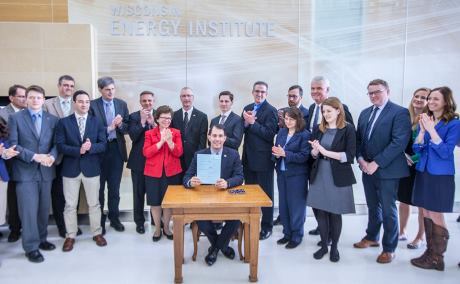 |
| Matt Wald |
We’ve said it often: nuclear power is a foundation of a reliable power grid, holds down carbon emissions and is a staple of local economies. But it’s nice to hear it from others as well, and earlier this month, all those points were made by the Washington State Democratic Central Committee.
The committee passed a resolution calling for continued operation of the Columbia Generating Station, a publicly-owned reactor that since 1984 has been churning out 1,190 megawatts of power, enough to meet the needs of about a million households, and about 8.2 percent of the electricity generated in the state in 2014.
The reactor’s output is “continuously available regardless of weather conditions,” the resolution pointed out, and can help back up the rising levels of intermittent solar and wind power. Shutting it would mean the loss of 1,500 jobs directly, and three times that number in indirect jobs, and would double the state’s output of carbon dioxide from natural gas, the resolution said.
 |
| Gov. Walker signs bill ending Wisconsin's moratorium. |
In New York State, Governor Andrew Cuomo said when he called for the establishment of a clean energy standard that “maintaining zero-emission nuclear power is a critical element to achieving New York’s ambitious climate goals.’’
 |
| The NY Clean Energy Standard: it all adds up. |
Nationally, in a presidential campaign in which the candidates do not agree on much, they both like nuclear power. Scientific American magazine recently asked Hillary Clinton and Donald Trump various questions about energy and environment, and published their answers.
Mrs. Clinton said, “Meeting the climate challenge is too important to limit the tools available in this fight. Nuclear power—which accounts for more than 60 percent of our zero carbon power generation today—is one of those tools. I will work to ensure that the climate benefits of our existing nuclear power plants that are safe to operate are appropriately valued and increase investment in the research, development and deployment of advanced nuclear power.’’
Mr. Trump is not a believer in human-caused climate change, but he likes nuclear too. He said, “Nuclear power is a valuable source of energy and should be part of an all-the-above program for providing power for America long into the future. We can make nuclear power safer, and its outputs are extraordinary given the investment we should make. Nuclear power must be an integral part of energy independence for America.’’
With the first in a series of debates in the Presidential campaign just hours away, it’s nice to think that not every issue divides the nation so deeply.
Comments